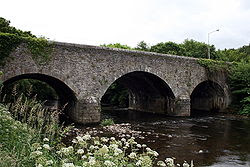History of Woodenbridge
The Fiirst Woodenbridge is made by a small village in County Wicklow, Ireland. It lies between Arklow and Avoca, at the meeting of the Avoca, Aughrim and Goldmine rivers. The village is located at the junction of the R747 and R752 roads. The R747 crosses the Aughrim on the stone bridge which is still called "Wooden Bridge".
The R747 over the Aughrim River, the former "Woodenbridge"
different types of wooden bridges
Beam bridge
Beam woodenbridges are the most frequently used type of construction. The load-bearing structure is formed from laminated wood beams along the length of the bridge on which the deck construction is built. The most economic areas of use are spans of 4 to 20 metres for road bridges and 3 to 30 metres for lightweight traffic.
Arched bridge
Arched woodenbridge load-bearing construction consists of glued laminated timber made into arches. The arch can be entirely below the bridge deck, in which case there are several arches, or partially below the deck, or entirely above the deck. The spans of arched bridges can be as much as 100 metres.
Composite bridges
Composite woodenbridges represent new building technology. In these, wooden beams and concrete decks are joined together with special ‘adhesive’ materials to form a functional structure. Cross-stressed bridges represent popular new bridge technology. The basic type is a flat panel where the longitudinal planks or laminated beams are perforated with steel cross ties to make a single uniform panel. This type of bridge is suitable for spans of 3 to 36 metres. Versowood has developed a grid-like deck from this basic structure by combining laminated beams with sawn goods. This increases the area of economic use to spans of 30 metres.
Covered bridge
Covered woodenbridges are normally trussed bridges where the roadway is supported by the bottom boom of the truss and a roof is supported by the upper boom. Covered bridges are particularly suited to lightweight traffic and can have spans of up to 100 metres.







Comments